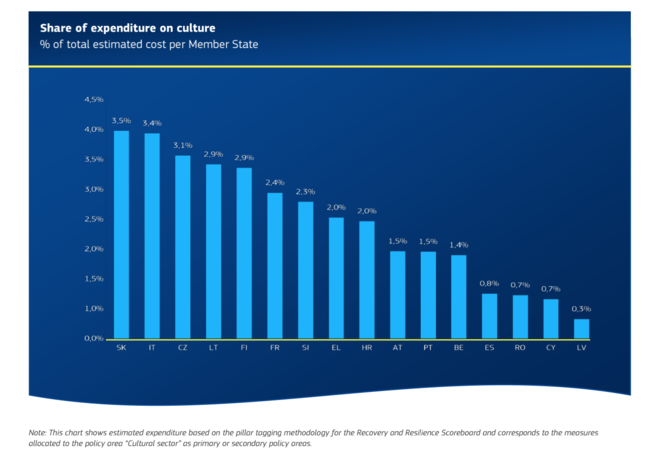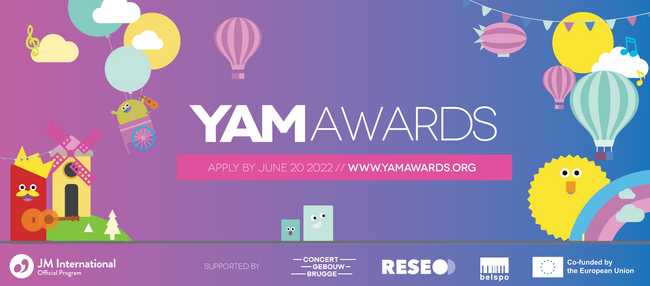
|
|
|
|
|
| |
|
| |
|
Dear readers,
|
| |
| It's Europe Day on 9 May! This is a good occasion to read up on updates from EU cultural policy and have a look at our "Music sector & Ukraine" info on the website. And don't miss: The EMC Fellowship call is out! Find out more below! |
| |
|
|
|
|
|
|
|
|
| |
|
|
|
EU Pact for Skills – Creative Pact for Skills Manifesto launched
| On 28 April, the European Commission launched the Creative Pact for Skills and published the Creative Pact for Skills (C-P4S) Manifesto. The partnership will promote learning opportunities and ‘on the job’ training to strengthen the resilience of the sector and set up its professionals with the skills they need. There will be a focus on digital, green, entrepreneurial, and technical skills as well as on arts and crafts. The partners involved – including EMC members FIM (International Federation of Musicians) and IMZ (International Music and Media Centre) – have agreed on commitments and indicators to improve skills intelligence, new training programmes and the number of people trained. The Creative Pact for Skills (C-P4S) Manifesto is open to endorsements. |
| |
| | | | | | |
| |
|
|
|
|
| |

|
|
European Commission publishes analysis on culture and creative industries in the RRF
| The European Commission has published an analysis on how the national recovery plans of the Recovery and Resilience Facility (RRF) take into account the cultural and creative industries. According to this analysis, 16 out of 27 recovery and resilience plans include measures targeting the culture and creative industries with a broad range of areas from greening the CCI, fostering innovation, internationalisation, social cohesion or ensuring digital transition. Some countries (such as Czechia, Greece, Romania and Spain) have included plans for legislative reforms to improve the working conditions of artists and cultural workers. |
| |
| | | | | | |
| |
|
|
|
|
| |
|
|
|
Meeting of the EU cultural ministers
The EU ministers responsible for culture, audiovisual, media and sport - in their role as Education, Youth, Culture and Sport Council (EYCS) - met on 4/5 April 2022 to discuss among other topics: the European response to the war in Ukraine in their respective policy areas as well as reinforcing intercultural exchanges and a European strategy for cultural and creative industries ecosystem.
The Council invited the Ukrainian Minister for Culture, Oleksandr Tkachenko, to address them via video conference. The ministers exchanged views on the various measures already taken and explored possibilities for further joint action. On 7/8 March 2022, the ministers had adopted a declaration on the situation in Ukraine in which they highlighted their support for Ukrainian artists, journalists, and cultural and media professionals, and expressed their willingness for further assistance.
Further exchanges of the ministers led to the adoption of two Council conclusions:
The Council conclusions on “Reinforcing intercultural exchanges” which will focus on the mobility of artists and cultural and creative professionals as well as multilingualism in the digital era in connection with issues of social cohesion and European citizenship. |
| |
| According to the Council conclusions “Building a European strategy for the cultural and creative industries ecosystem”, this strategy should be coordinated by the European Commission in close cooperation with the EU Member States and focus on 5 priorities such as access to funding, skills development, cultural diversity in the digital era, strengthening exports and further policy development. |
| |
| | | | | | |
| |
|
|
|
|
| |
|
|
|
European CCS in the digital decade
| The European Commission has recently published two studies on the challenges and opportunities for cultural and creative sectors in the ‘digital decade’. While not all CCS are equally impacted by digital technology, the Commission highlights the importance of mapping the challenges and opportunities of digital technologies such as Artificial Intelligence (AI) as they can have an impact across the value chain, from production to distribution and promotion. |
| |
| Study on Opportunities and Challenges of Artificial Intelligence (AI) Technologies for the Cultural and Creative Sectors focuses on concrete examples of organisations using AI across ten creative sectors including Music, Film, and the Performing arts. |
| |
| Study on Copyright and New Technologies: Copyright Data Management and Artificial Intelligence looks at the impact of new technologies on the CCS from a copyright perspective and is structured in two parts. The first looks into the potential use of new technologies to improve the management of data linked to copyright-protected content and provides ideas to increase interoperability of metadata. The second part investigates the copyright-related challenges raised by the use of AI, including possible emerging legal questions related to the interaction between the copyright legal framework and AI. |
| |
|
|
|
|
|
|
| |
|
|
| |
|
|
|
Creative Shift Policy Recommendations
| Creative Shift is a pilot project funded by the European Commission and was designed with the goal of innovating Europe’s cultural and creative sectors and industries (CCSI). It was initiated by seven European partners with backgrounds in the book, music, gaming, and audio-visual sectors, including the EMC. It involved a community of more than a hundred professionals from the CCSI. The recommendations call for a more risk-taking, bold approach to the sector, bringing together entrepreneurs, institutions, policy makers, and citizens at large, in which CCSI can fully embrace their role as “the essence of transformation” within European society. The document includes general policy recommendations to strengthen CCSI e.g. through financing and investment, cooperation with ICT, just recognition and fair remuneration and cross-sectoral collaboration. Other recommendations focus on innovation, research and development prioritising ecological, social and economic sustainability, ICT as well as information and education. |
| |
| | | | | | |
| |
| |
| |
|
|
|
|
|
|
| |
|
|
|
Recommendations "One Voice for European Music"
Last month, the Centre national de la musique (CNM) from France organised the “One Voice for European Music” event. Complementing the crucial advocacy work delivered through the AB Music Working Group and the European Agenda for Music, its main objective was to bring together many relevant and active European music organisations to set in motion a new dynamic around key themes: mobility, knowledge of the sector, innovation, green transition.
The outcome of this process is a set of recommendations to fully unlock the potential of the Music Moves Europe process, in the general interest of the European music sector. Some of these include a call to European Institutions to develop scaled-up and ambitious cascading grant schemes to increase European programming and cooperation in the current and future Creative Europe programmes and promote new models and incentive mechanisms to help the music sector contribute to tackling the climate and environmental crises through policy and support measures, while building on existing experimentations (e.g., MusicAIRE); |
| |
| | | | | | |
| |
|
|
|
|
|
|
|
|
|
|
|
| |

|
|
Applications now open
European Music Council Fellowship Programme 2022/23
| The EMC Fellowship Programme 2022/23 is now welcoming applications! |
| |
The fellowship offers emerging professionals working in the field of music an opportunity to internationalise their careers and to develop professionally.
The EMC Fellows are open-minded people, motivated to engage in cultural policy discussions and committed to the values of musical diversity and the ideals of the Five Music Rights.
HOW TO APPLY
Please send your application for the Fellowship programme to Andrea Murzi – murzi@emc-imc.org – by Monday, 16 May 2022 at 12:00 CET with the subject line Fellowship Programme. |
| |
| | | | | | |
| |
|
|
|
|
| |
|
|
|
Music Moves Europe: Strengthening the dialogue with the music sector
| This open call for tenders aims at strengthening the dialogue with the music sector in Europe for the next years. The services to be provided will mainly consist of three tasks, including: |
| |
| 1. A request for conceptual work to provide an updated definition on Europe’s music ecosystem. |
| |
| 2. Creating a series of Music Moves Europe dialogue meetings (max. 3 per year) at major music conferences in Europe, involving music professionals and focusing on topical themes for the sector that have relevance for EU and national policy making on music. |
| |
| 3. An EU level conference on music (at least every second year), involving the EU institutional level, Member States’ representatives and representative European music organisations/associations to take stock of developments relevant for the music sector at large, and to steer the EU policy agenda on music. |
| |
This call will implement the new sectorial action on music, under the Annual Work Programme 2021 of Creative Europe.
Deadline: 15 June 2022
| | | | | | |
| |
|
|
|
|
|
|
| |

|
|
YAMawards 2022
| The 13th edition of the YAMawards, organised by EMC member JM International, is officially open and accepting applications, with a new exciting category specially dedicated to School Concerts! |
| |
| Participation is open to all live music productions for audiences up to 18 years of age. Entries from soloists, groups, ensembles or orchestras will be judged based on the quality of music, the quality of performance, the relevance/necessity of the program, audience communication and impact. |
| |
| Previous winners include Orthemis Orchestra (Spain), Zonzo Compagnie (Belgium), Shadow Music (Norway), La Balle Rouge (France), Rikskonsertene/Kulturtanken (Norway), Oorkaan (The Netherlands), Smalands Musik&Teater (Sweden), Body Rhythm Factory (Denmark), Zonzo Compagnie (Belgium), Jazz for Juniors (South Africa) and Muziektheater Transparant (Belgium). |
| |
| Applications close on the 20th of June, 2022 and nominees will be announced on the 15th of September 2022 |
| |
| | | | | | |
| |
|
|
|
|
|
|
| |
|
|
|
EMC Resource Page
| Following EMC's statement in solidarity with the people of Ukraine and the music sector in all its diversity on March 3, we have launched a separate page on our website to highlight initiatives for the music sector in Ukraine. It is a non-exhaustive list and will be updated regularly. If you have an initiative that you believe should also be included, please share it with us via email: info@emc-imc.org |
| |
| | | | | | |
| |
|
|
|
|
| |
| The EMC is a regional group of the |
 |
|
| The EMC is supported by |
 |
|
|
|
|
|
|
|
|
| |
| |
This communication reflects the views of the EMC only and the European Commission cannot be held responsible for any use which may be made of the information contained therein.
|
|
|
|
| |
You have received this newsletter because your are on the mailing list of the European Music Council. If you no longer wish to receive any emails from the European Music Council, please reply to this email writing "unsubscribe newsletter" in the subject line.
|
|
|
|